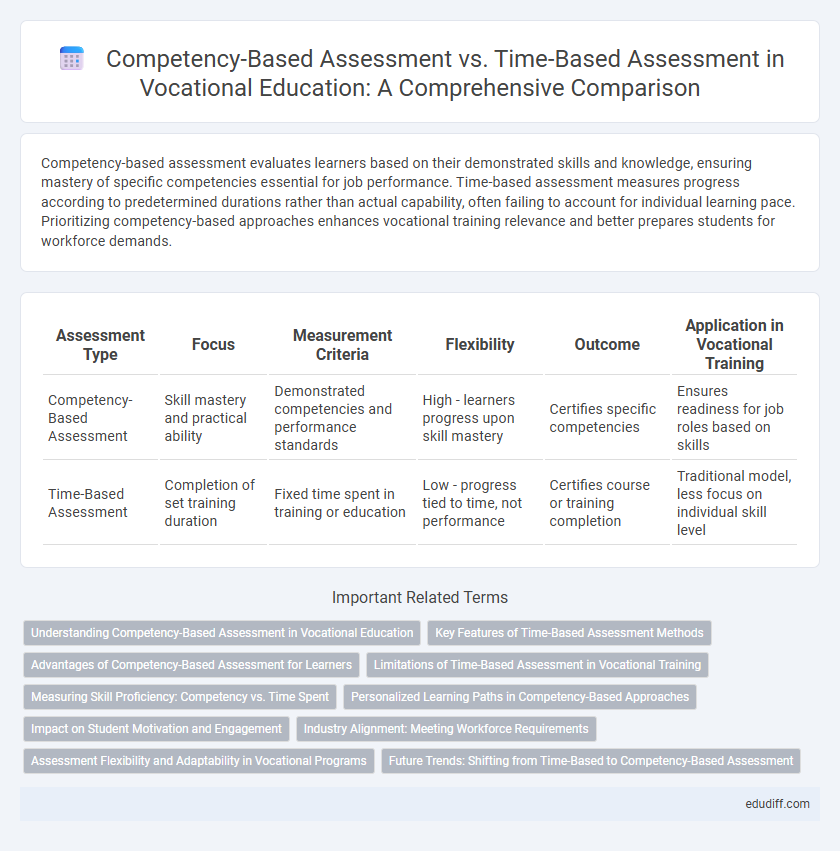Competency-based assessment evaluates learners based on their demonstrated skills and knowledge, ensuring mastery of specific competencies essential for job performance. Time-based assessment measures progress according to predetermined durations rather than actual capability, often failing to account for individual learning pace. Prioritizing competency-based approaches enhances vocational training relevance and better prepares students for workforce demands.
Table of Comparison
| Assessment Type | Focus | Measurement Criteria | Flexibility | Outcome | Application in Vocational Training |
|---|---|---|---|---|---|
| Competency-Based Assessment | Skill mastery and practical ability | Demonstrated competencies and performance standards | High - learners progress upon skill mastery | Certifies specific competencies | Ensures readiness for job roles based on skills |
| Time-Based Assessment | Completion of set training duration | Fixed time spent in training or education | Low - progress tied to time, not performance | Certifies course or training completion | Traditional model, less focus on individual skill level |
Understanding Competency-Based Assessment in Vocational Education
Competency-based assessment in vocational education measures students' ability to perform specific skills and demonstrate practical knowledge essential for the workplace, rather than the duration spent in training. This approach ensures learners achieve industry-aligned standards by assessing real-world competencies, enhancing employability and job readiness. Competency-based methods provide personalized learning pathways and immediate feedback, contrasting with traditional time-based assessments which focus on completing fixed instructional hours.
Key Features of Time-Based Assessment Methods
Time-based assessment methods emphasize evaluating learners based on the duration spent on training or coursework, measuring competence through fixed time intervals rather than skill mastery. These methods rely on standardized instructional hours and set schedules to ensure uniform progression across all participants. The key features include adherence to prescribed time frames, consistent pace regardless of individual learning differences, and standardized evaluation criteria tied to time spent rather than demonstrated competencies.
Advantages of Competency-Based Assessment for Learners
Competency-based assessment allows learners to demonstrate mastery of specific skills at their own pace, promoting personalized learning and greater engagement. It ensures that students acquire relevant competencies required for real-world vocational tasks, increasing employability and job readiness. This approach also supports continuous feedback and targeted improvement, leading to higher educational outcomes compared to traditional time-based assessments.
Limitations of Time-Based Assessment in Vocational Training
Time-based assessment in vocational training often fails to capture individual learner progress, as it emphasizes fixed duration over mastery of skills. This approach can result in underprepared graduates who have not achieved the necessary competencies for their trade. Competency-based assessment addresses these limitations by ensuring learners demonstrate specific abilities before advancing or completing their training.
Measuring Skill Proficiency: Competency vs. Time Spent
Competency-based assessment measures skill proficiency by evaluating the actual demonstration of knowledge and abilities against specific industry standards, ensuring learners meet predefined criteria regardless of time invested. Time-based assessment emphasizes the duration spent in training or coursework without necessarily confirming mastery, potentially allowing gaps in practical skills. Prioritizing competency ensures that vocational learners are job-ready with validated skills, while time-based models may overlook individual learning pace and true expertise.
Personalized Learning Paths in Competency-Based Approaches
Competency-based assessment emphasizes mastery of skills at an individual pace, allowing learners to progress upon demonstrating proficiency rather than completing a fixed time period. This approach enables personalized learning paths tailored to each learner's strengths and areas for improvement, increasing engagement and efficiency in vocational training. Time-based assessment often leads to uniform progression, which may not accommodate diverse learning needs or real-world skill readiness.
Impact on Student Motivation and Engagement
Competency-based assessment enhances student motivation and engagement by allowing learners to progress at their own pace, focusing on mastering skills rather than meeting arbitrary time limits. This approach fosters deeper understanding and intrinsic motivation as students see tangible evidence of their competencies. In contrast, time-based assessment often leads to disengagement due to fixed schedules and pressure to complete tasks regardless of actual skill acquisition.
Industry Alignment: Meeting Workforce Requirements
Competency-based assessments prioritize mastery of specific skills and knowledge directly aligned with industry standards, ensuring learners meet precise workforce requirements. Time-based assessments often measure progress by hours spent rather than skill proficiency, potentially causing gaps in job readiness. Employers increasingly favor competency-based models for their ability to deliver workforce-ready graduates who can immediately contribute to business needs.
Assessment Flexibility and Adaptability in Vocational Programs
Competency-based assessment in vocational programs emphasizes mastery of specific skills and knowledge, allowing learners to progress at their own pace, which enhances assessment flexibility and adaptability to individual learning styles. Time-based assessment adheres to fixed schedules, potentially limiting responsiveness to diverse learner needs and varying skill acquisition rates. Emphasizing competency-based methods supports personalized learning paths and better alignment with industry standards, improving overall vocational training effectiveness.
Future Trends: Shifting from Time-Based to Competency-Based Assessment
Future trends in vocational education reveal a significant shift from time-based assessment, which measures student progress by hours spent, to competency-based assessment that evaluates learners by demonstrable skills and knowledge mastery. This transition aligns with industry demands for workforce readiness and personalized learning trajectories, ensuring assessments accurately reflect job-relevant competencies. Technology-enabled platforms and data analytics increasingly support this shift by providing real-time feedback and customized competency frameworks.
Competency-based assessment vs Time-based assessment Infographic

 edudiff.com
edudiff.com